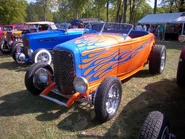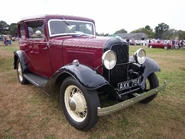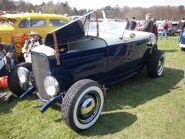
1932 Ford
The Model B was a new Ford automobile produced in model year 1932. It was a much updated version of the Ford Model A (1927) and remained largely unchanged until the 1933 model year, when the updated Model C was introduced.
Strictly speaking the Model B was a four-cylinder car with a Ford Model A (1927), but it was at this time that Ford began producing a very similar car with Ford's new Flathead V8 engine. The V8 car was marketed as a Model 18, though it is commonly called the Ford V-8 today, and was virtually indistinguishable from the Model B. Until this time, Ford had always produced only one basic car at a time.
There were two versions of the ’32 – a four-cylinder and the V-8 flathead. They came in two body styles, the "5-window" (two door windows, two quarter panel windows and the rear window), and the rare "3-window" Deluxe Coupe that featured front opening doors, also known as Suicide Doors. The Deuce was called Model 18, the “1” standing for “first” and the “8” for V-8. The less popular Model B was the four-cylinder model, a refined version of the four-cylinder Model A.
The ’32 Model 18 was the first successful V-8 in a low-priced car. The 65-hp engine was used in some models costing $460. There were 14 different body styles – like the roadster, coupe, sport coupe, two-door and four-door Sedans, Cabriolet and phaeton. Prices ranged from $460 for the roadster and the coupe's $490 to the $650 convertible sedan. Production totals numbered only 520 for the roadster and 28,904 for the two-door coupe. Nowadays, the Roadster and Coupe are notable, as these body styles are more used in making the models into streetrods.
Today, the 1930s Model B is a highly collectible car that people will pay thousands of dollars to restore to exact original style. During the WWII period, when they were first getting old, the Model Bs and V8s were frequently altered into Hot rods. This continued into the 1960s on a large scale. Since the 1970s, 1932 bodies and frames have been expensive, which has reduced the number of "rods" being created. Those that are made, however, are quite evolved and often very expensive.
Deuce coupe[]

White deuce coupe example
Deuce coupe is a slang term used to refer to the 1932 Ford coupe, derived from the year of manufacture. In the 1940s, the '32 Ford became an ideal Hot rod. Hot rodders would strip weight off this readily available car and soup-up the engine. They came in two body styles, the more common "5-window" (two door windows, two quarter panel windows, and the rear window), and the rare "3-window" Deluxe Coupe that featured front-opening "Suicide doors."
Modern hot rods[]
Most newly built hot rods use fiberglasses or more expensive, newly minted, custom steel bodies. The classic model B, 1932 lines are usually closely followed with new bodies. Sometimes original bodies are used. However the cost of originals is quite high.
In popular culture[]
In 1963, The Beach Boys band released an album titled Little Deuce Coupe. The band's eponymous Little Deuce Coupe only heightened the popularity of the car.
The song "Blinded by the Light", originally written and performed by Bruce Springsteen and later Manfred Mann, also contains lyrics that allude to a 1932 Ford coupe.
In 1973, George Lucas filmed American Graffiti. The character John Milner (played by Paul Le Mat) drove a yellow deuce coupe. This film is credited for introducing the old style hot rod to a new generation.
The legendary duo Bonnie and Clyde were ambushed and killed in a Ford V-8. The car, which took approximately 130 rounds and shells of shotgun, pistol, and automatic rifle, is now on display along with the shirt Clyde died in at the Primm Valley Resort in Primm, Nevada.
In Motor City Online, one of the playable cars is a 1932 Ford Coupe.
Stephen King's novel The Stand character The Kid drove 1932 Ford deuce coupe.
1933 Ford[]

1933 Ford Coupe

1933 Ford Sedan
The 1933 revision of the car was substantial, especially considering how important the 1932 change had been. For its second year, the Ford's wheelbase was stretched from 106 in (2692 mm) to 112 in (2845 mm) on a new crossmember frame. The grille was revised, gaining a pointed forward slope at the bottom which resembled either a Shovel or the 1932 Packard. Both the grille and hood louvers curved down and Coupe
Power from the V8 was also increased to 75 hp (56 kW) with a revised ignition system. The four-cylinder engine continued unchanged. Total sales for the model year were up to 311,113. 1933 Fords are also popular starting points for hot rod construction.
In popular culture[]
ZZ Top's emblematic car, Eliminator (featured in the painting on the cover of the album of the same name and in several related music videos), is a 1933 Ford three window coupe. Rockstar Games' 2005 video game Grand Theft Auto: San Andreas features a vehicle called the 'Hustler', which borrows heavily from the styling of the 1933 Ford.
- A 1937 Ford V8 was featured in the The Adventures of Tintin book, King Ottokar's Sceptre.
1934 Ford[]

1934 Ford Coupe Hot Rod
The 1934 Ford (called the Model 40A) was not as substantial a model year change as the previous two years had been. Noticeable changes included a flatter grille with a wider surround and straight hood louvers. V8 output was again upped, this time to 85 hp (63 kW), and the four-cylinder Model A engine was in its last year as was the Victoria body style.












